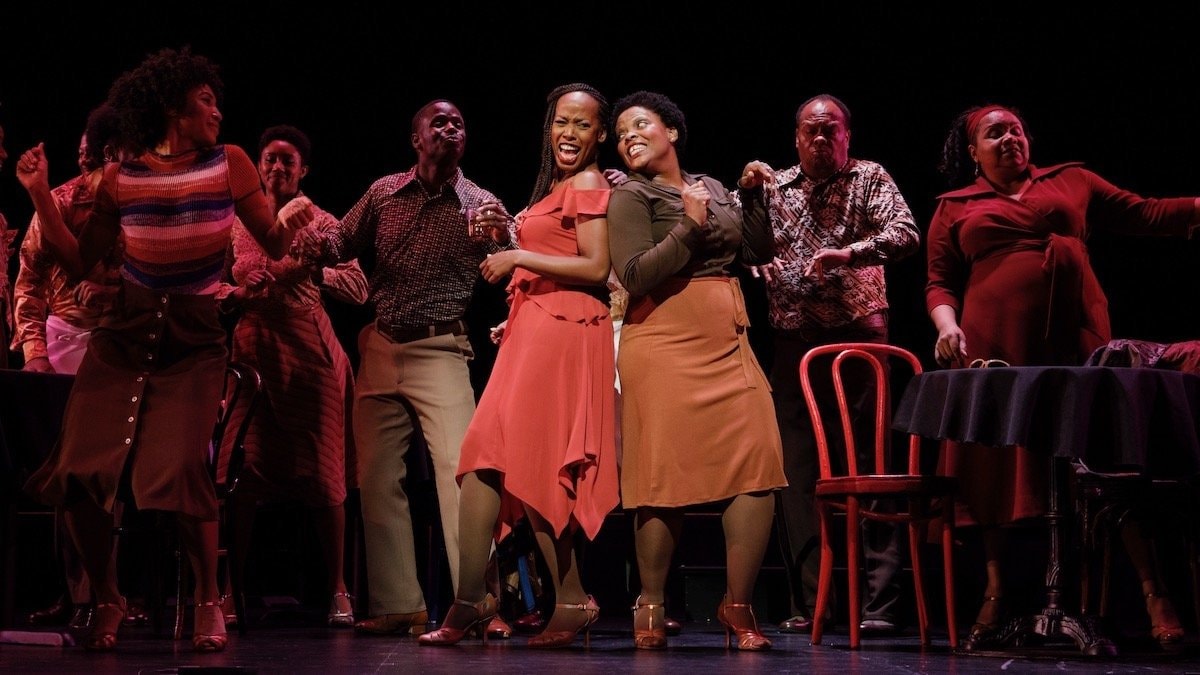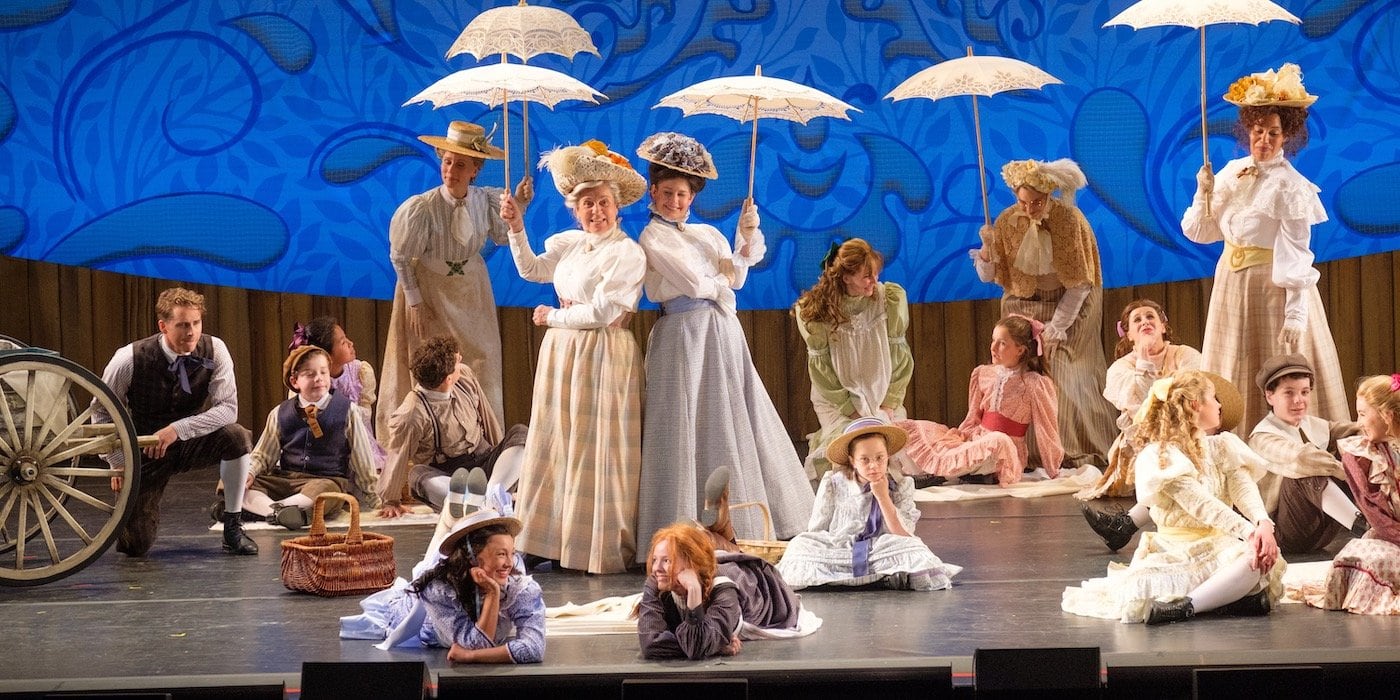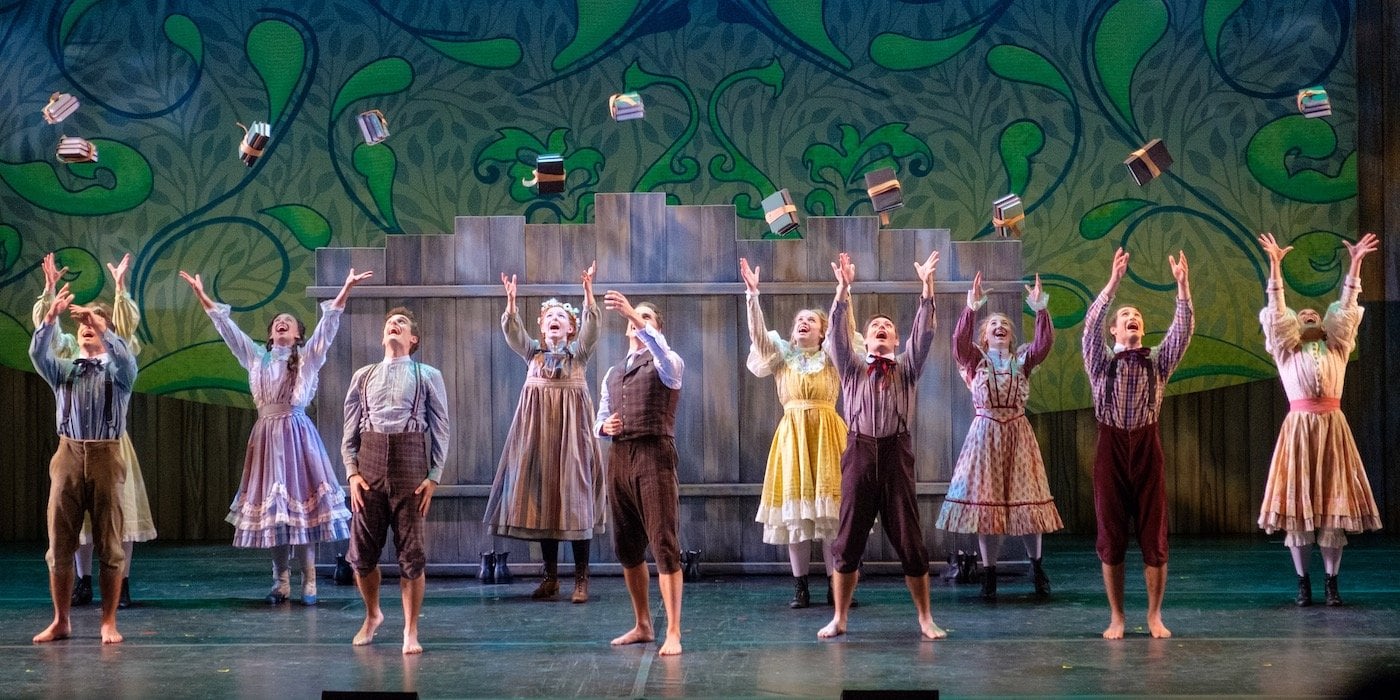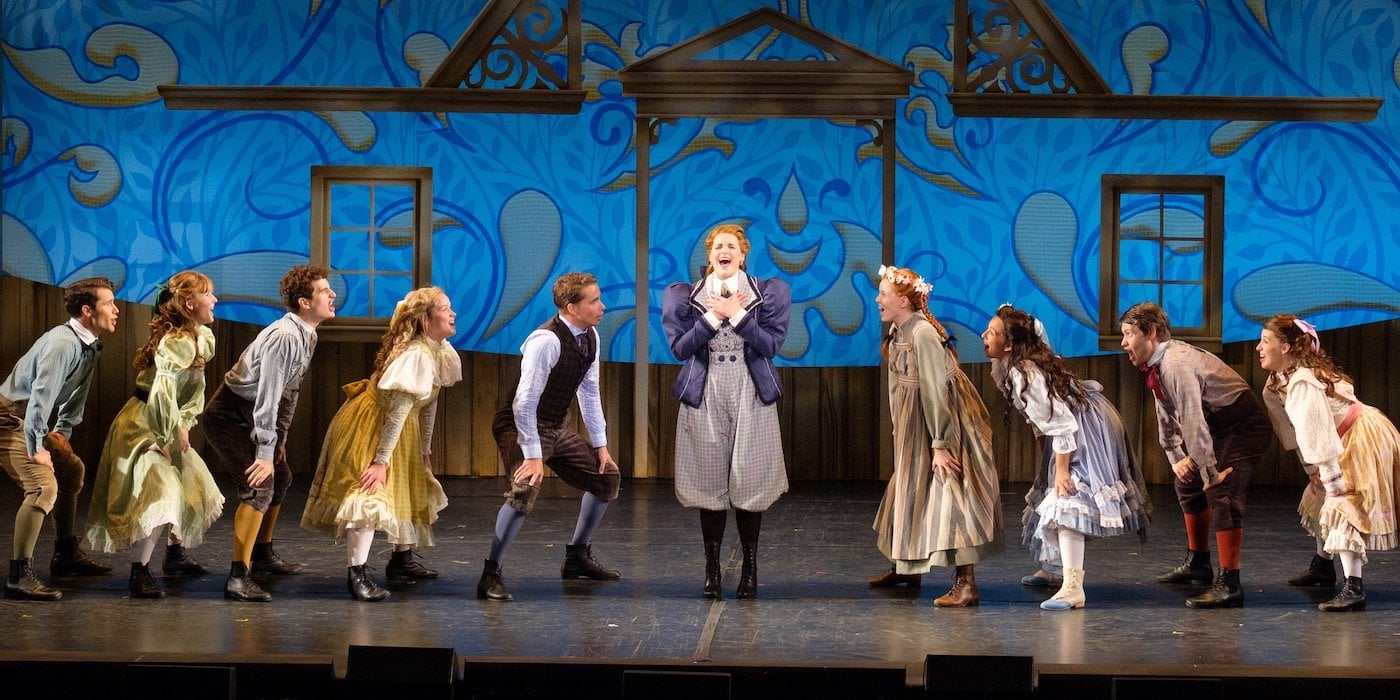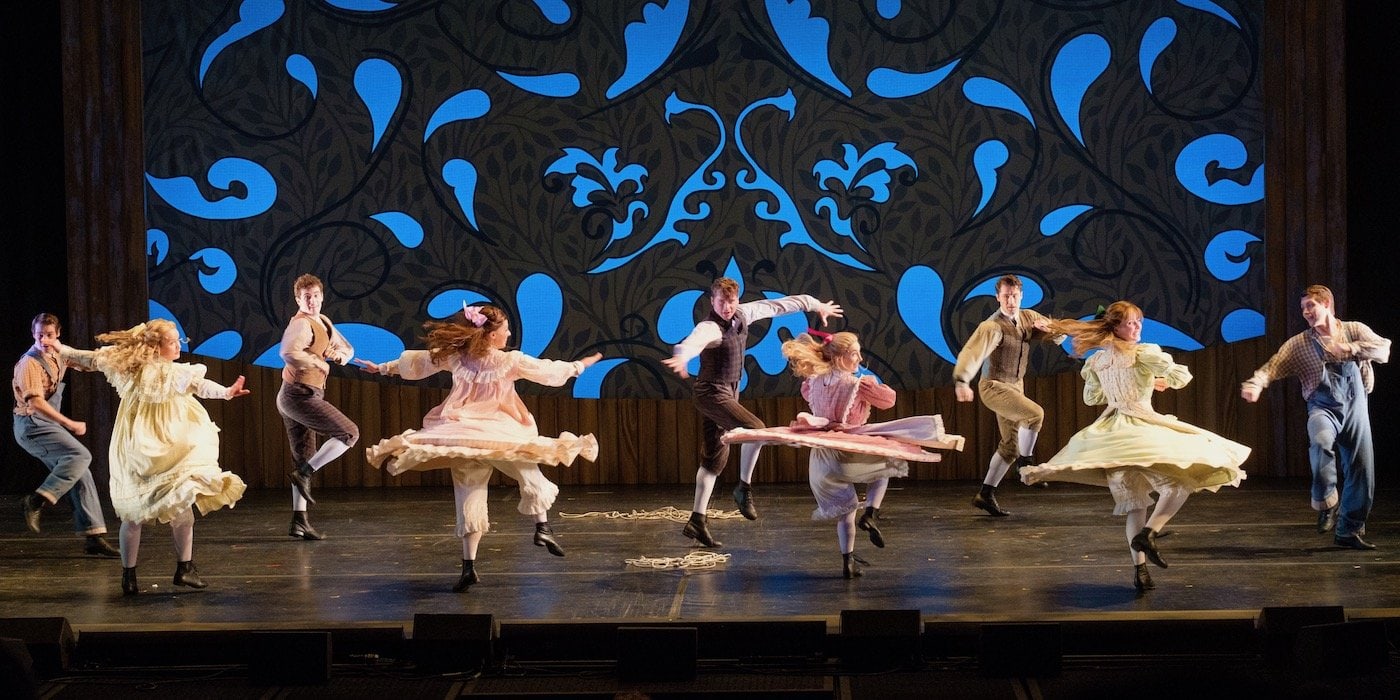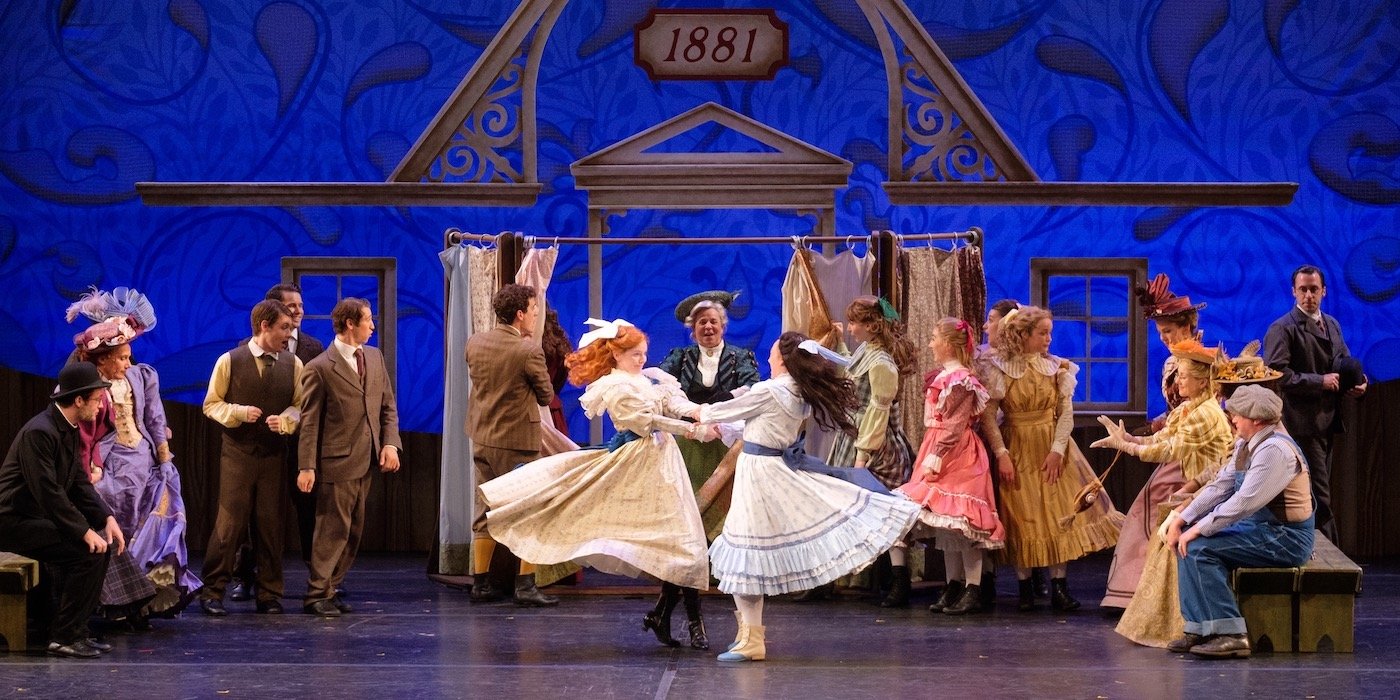
Anne of Green Gables – The Musical, which has been recognized by Guinness World Records as the world’s longest-running annual musical theatre production, continues to enthrall audiences worldwide, more than half a century after its world premiere. This year, we’re celebrating the 50th anniversary of the show’s premiere in the US; it debuted off-Broadway at New York’s City Center on December 21, 1971. To celebrate, we spoke with Robin Campbell and Geoff Campbell about the show’s history, impact and enduring appeal.
Robin and Geoff are two of the sons of Norman and Elaine Campbell, the composer and lyricist, respectively, who collaborated with Don Harron and Mavor Moore to create Anne of Green Gables – The Musical. Growing up watching the musical being produced on stage at the Charlottetown Festival since its inception in 1965, Robin and Geoff continue to celebrate the legacy as screenwriters for an animated feature film of the show.
In addition, Robin has enjoyed a career as a television director and Geoff held the position of Senior Model Supervisor at Industrial Light and Magic from 1990 to 2019.
…
Anne of Green Gables – The Musical is, of course, adapted from the beloved 1908 novel by Canadian author Lucy Maud Montgomery. For those who don’t know the novel, can you briefly summarize the story?
Geoff: Sure. Anne of Green Gables is the story of a charming but irascible red-headed orphan named Anne Shirley. She’s mistakenly adopted by Matthew and Marilla Cuthbert, two elderly siblings who live at the Green Gables farm on Prince Edward Island on the east coast of Canada. The Cuthberts thought they were getting a boy to help out with the chores, but after hearing of Anne’s tumultuous life at the orphanage, they decide to keep her. Because of her quick-tempered nature, Anne continually gets into trouble, but eventually she wins over the town of Avonlea through her indomitable spirit and finds a lasting home in Green Gables.
How would you describe the tone of the musical?
Robin: Great question. Anne of Green Gables – The Musical has an overall tone that is bright and upbeat. It has dialogue by Don Harron that’s both dramatic and witty, a sweeping score by Norman Campbell, endearing songs with evocative lyrics by the entire creative team (Don, Norman, Elaine and Mavor), and exhilarating dance numbers that truly come alive on stage.
Geoff: The show is comedic, but also tugs at the heartstrings. Critics raved about it. The New York Times entertainment critic Clive Barnes wrote: “Anne of Green Gables – The Musical is lighthearted and light-headed. It is also gently sentimental and fiercely wholesome.” It’s a wonderful show for the entire family.
What about its musical style?
Robin: Originally composed in 1956, it’s truly an authentic classical musical in the style of Rodgers & Hammerstein.
Geoff: It starts with a classic symphonic overture and ends with a coda, and has 14 songs, all of them memorable, from poignant solo ballads to rousing full-cast dance numbers.
Robin: And what I truly appreciate is that each song is unique in tempo, structure and style, and was created to convey character emotions and to advance the plot.
2017 Charlottetown Festival production of Anne of Green Gables – The Musical (Louise Vessey)
In what ways does the musical differ from the novel?
Geoff: Don Harron did a brilliant job of selecting the best events of the novel and amalgamating them into a series of scenes that fit a two-act play structure.
Robin: It’s true. When I recently reread the novel, I realized that the one bedroom scene with Anne and Marilla is actually a composite of many bedroom passages over different nights in the book. I was impressed at how Don made it seamless.
Geoff: Same with the school pageant scene. It’s much more detailed in the novel, but in the musical Don’s masterly structure condenses a number of events that lead to the conclusion of the play. In that one scene we see Anne’s character arc grow as her hard work pays off and she wins the Avery scholarship. We see the town try to take credit for her accomplishment, but the schoolteacher sets them straight. We see that Gilbert, once Anne’s sworn enemy, now celebrates her success, and for the first time Anne doesn’t rebuff him. And through all of that we see that Matthew is unwell and leaves the proceedings early.
Since its publication, the novel Anne of Green Gables has been translated into at least 36 languages and has sold more than 50 million copies, making it one of the bestselling books worldwide. Do you recall when you first read the book? What was your reaction at the time?
Robin: I first read the book when I was 9 years old because the musical was being mounted in Charlottetown that year, and since it was our parents’ new show, I felt somewhat obligated. I also remember worrying that I was reading a book for girls, but as it turned out, it’s a wonderful story that anyone can relate to.
Geoff: I’ll admit, I’ve haven’t read the book in its entirety, but I do have a well-leafed copy that I consulted when Rob and I were adapting the musical for our animated feature film screenplay.
Yes, tell us more about the upcoming film adaptation.
Geoff: It was always the dream of Don, Norman and Elaine to realize a feature film version of Anne of Green Gables – The Musical. Coming from a background of digital animation and visual effects, I always thought an animated feature film would be an exciting medium to showcase the musical. Animation as an art form can highlight the comedy, drama and passion of the characters, utilize vibrant colors to celebrate the beauty of Prince Edward Island, create a stylization to recreate the early 19th century period, and most importantly, vividly illustrate Anne’s evocative imagination.
Robin: To that effect, on Geoff’s suggestion the two of us wrote the screenplay, which is currently in development. Overall, we’re delighted that the show has run for as long as it has, and we are truly excited to be a part of its legacy.
Anne of Green Gables – The Musical has certainly withstood the test of time! Audiences continue to adore it more than 50 years after its stage debut. What, in your estimation, is the enduring appeal of this show?
Robin: Lucy Maud Montgomery gave us a romantic story with lovable characters, but Don, Norman, Elaine and Mavor added clever dialogue, evocative music and lyrics, and exhilarating dance numbers to create the appealing, enduring musical that it is. It really has stood the test of time.
Why do we still love it?
Geoff: It’s about belonging. Finding our place in the world. And even though it’s set in another period, it’s still something people of any age can relate to today. At first Anne struggles for inclusion, but eventually she finds a loving family with Marilla and Matthew and wins the hearts and minds of the townsfolk. The audience always leaves the theatre uplifted.
2017 Charlottetown Festival production of Anne of Green Gables – The Musical (Louise Vessey)
What was your first personal experience of Anne of Green Gables – The Musical?
Geoff: I was 5 years-old the first time I saw the show and I was so shocked when Matthew died that my parents had to take me backstage to meet Peter Mews, the actor who played him, to prove that he was still alive.
Anne of Green Gables is set in Prince Edward Island, so the novel and musical are particularly beloved throughout Canada. What elements of the story and the musical are uniquely Canadian? What elements are universal?
Robin: The musical itself is universal, it’s loved around the world. But the location, sets and costumes are all uniquely Canadian, modelled on Prince Edward Island in the late 1800’s. It truly reflects the local lore and challenges of rural island life.
Do you have a favorite moment or song from the show?
Geoff: My favorite song would have to be “The Words.” This is Matthew’s song in which he yearns to say what’s in his heart but can’t speak up. And that leads to my favorite moment in the show, which occurs after Matthew passes away: Marilla is in the kitchen fixing a cup of tea for Rachel Lynde and you can hear a pin drop as she ties on her apron. She then looks over to see Matthew’s empty rocking chair and haltingly begins to sing the reprise of “The Words,” revealing just how much she loved her brother, but like him, was never able to find the words. From that moment on, there isn’t a dry eye in the house.
Robin: Although “Wonderin’” is such a beautiful ballad about first love, my favorite song is “We Clearly Requested” because it’s sung in a round with ingenious lyrics that overlap. And I suppose my favorite moment is when Anne and Gilbert finally acknowledge their friendship and budding romance – as a hopeless romantic it’s the most rewarding part of the resolution for me.
Which song is the biggest crowd-pleaser?
Robin: “Ice-Cream.” It’s a spectacular song and dance number that involves the entire cast as they make homemade ice-cream at a picnic…
Geoff: Which Anne has never tasted…
Robin: And it builds to a beautiful crescendo to end the first act, at the same time showing Anne’s integration into the town of Avonlea.
Geoff: And then there’s “Open the Window,” sung by Miss Stacy, the inspirational new schoolteacher who takes her class outside for their first lesson. Over the years there’s been a lot of talented performers playing the role who can really belt it out.
For generations, people have loved the character of Anne Shirley. What is it about this character that continues to appeal to us?
Geoff: When the audience first sees Anne Shirley at the train station, she appears nervous, awkward and overly talkative, but by the end of the show Anne has evolved into a bright young woman who is confident, clever and capable, but still maintains her vivid imagination and enthusiasm for life. Very inspirational.
Robin: I think the voices heard during the overture say it all: “Though blossoms fade and friends must part, old grow the songs we’ve sung, Anne of Green Gables in our hearts, you are forever young.”
This show has so many other colorful characters as well. Who’s your personal favorite?
Geoff: Matthew. Although he’s painfully shy, he takes to Anne immediately and becomes her confidant. I like that he’s not ruffled at all by Rachel Lynde, the provocative town gossip.
Apart from Anne, which character do audiences most often connect with?
Geoff: To me that would also be Matthew. He loves Anne unconditionally and helps her through her tempestuous moments. He’s her ally when she really needs one.
2017 Charlottetown Festival production of Anne of Green Gables – The Musical (Louise Vessey)
The Harron/Campbell musical adaptation of Anne of Green Gables began in 1956 as a television movie broadcast on the CBC. What do you know about the genesis of the show?
Robin: In the early days of live television, Don Harron and Norman Campbell both worked for the Canadian Broadcasting Corporation in Toronto. When Don read the Anne of Green Gables novel to his young daughters, he realized the story’s potential and approached Norman with the idea that the book could make a marvelous musical. In full agreement, Don, Norman, Elaine Campbell and Mavor Moore began collaborating on the musical book, score and lyrics. Interestingly enough, Anne of Green Gables – The Musical was originally developed for a television audience and broadcast live across Canada in black & white by the CBC in Toronto in 1956.
And how did that version differ from the one we now enjoy?
Geoff: In 1964, the newly constructed Confederation Centre of the Arts theatre in Prince Edward Island opened, and Mavor Moore, Founding Director of the Charlottetown Festival, put together a gala Canadian musical revue. Several songs were chosen from Anne of Green Gables – The Musical TV production and performed on stage before an audience that included Queen Elizabeth II. After the show, the delighted Queen praised the songs and asked, “Now, where is the rest of the show?” Mavor, Don, Norman and Elaine took that as a Royal Command and the rest is history.
Robin: The following year it began its long reign as a widely popular, full-fledged musical stage production, shaped by the talents of Alan Lund, choreographer, Murray Laufer, set designer, and Marie Day, costume designer.
And I understand there’s a ballet version as well!
Robin: Yes. In the late 80’s our father took his score for the musical and adapted it to a ballet, with an arrangement by world renowned Robert Farnon. In 1989 the Anne of Green Gables Ballet had its world premiere, performed by the Royal Winnipeg Ballet of Canada. And in 2019 Ballet Jörgen of Canada mounted their own arrangement entitled Anne of Green Gables – The Ballet. I think it’s wonderful that this beautiful, memorable score has seen new life in another venue.
The musical has been running continually (with a brief interruption due to the Covid pandemic) for over half a century. Do you regularly attend the show?
Geoff: Yes. Having fallen in love with Prince Edward Island, I try to get down to see the show every summer with my family, and of course my kids love it. And I haven’t yet had to take my daughter backstage to prove that Matthew didn’t really die.
How has it changed over the years?
Robin: In its 55 years run at Charlottetown, Anne of Green Gables – The Musical has definitely seen changes, especially in sets and costumes. Lines of dialogue have also been updated over the years to reflect changing times, and even a song was replaced. When the production was mounted in London’s West End in 1969, the song “Bosom Friends” was removed, and the new song “Kindred Spirits” was composed and written so as not to conflict with the song “Bosom Buddies” in the musical Mame, even though Anne of Green Gables – The Musical preceded it. Also, the Festival’s casting has become more diverse as it reflects the multiculturalism of Canada.
How has the audience response changed?
Geoff: It hasn’t, really. Audiences continue to revere Anne of Green Gables – The Musical, from generation to generation. You often see young girls in the audience wearing braided red-hair wigs sitting with their parents and grandparents. The musical’s popularity has led to successful English-speaking productions mounted around the world, including New York, London, Toronto, Sweden and Japan. In 1980 it was translated into Japanese by the Shiki Theatrical Company and has played in Japan for many years since.
2017 Charlottetown Festival production of Anne of Green Gables – The Musical (Louise Vessey)
Do you have a particular memory of a specific production of Anne of Green Gables – The Musical?
Robin: I’ve enjoyed all the professional performances of Anne of Green Gables – The Musical I’ve seen in Canada and England, but what I remember the best is a local community theatre production in British Columbia in which they had a reduced cast, no sets, and only a piano, and yet the inspired cast and production beautifully captured the magic of the musical.
What makes this show ideal for theatres and schools?
Geoff: Firstly, this musical appeals to all ages. Secondly, it provides a positive message: although it takes place at the turn of the last century, the lessons learned remain timeless. Thirdly, it has a compelling story. Although Anne Shirley is at first discouraged by the nasty opinions and gossip, she eventually makes her way to the top of her class and ingratiates herself with the townspeople. And although she matures considerably, she never loses her charm as an imaginative, clever young woman. Finally, the dialogue and songs are full of joy and enchantment – it’s an uplifting experience for the cast and crew as well as the audience.
What elements of the musical appeal most to producers and audiences?
Geoff: It’s an easy production to mount. For professional theatres, sets and costumes can be as simple or as elaborate as desired, and for community theatre and schools, the musical can be accompanied by a single keyboard or an entire orchestra.
Robin: And what Samuel French/Concord Theatricals offers is really helpful. You provide a piano/conductor digital score so instrumentalists can accompany and play the show, and if a production doesn’t have access to musicians, Concord offers the option of Rehearsal and Performance Tracks.
What message do you hope people glean from Anne of Green Gables – The Musical?
Robin: I think the musical promotes tolerance and kindness, especially because there are many disenfranchised people out there. Marilla and Matthew, against their better judgement, adopt an orphan girl whose need for compassion, care and a home outweighs their need for hiring a boy to help out on the farm. And although the townsfolk do their best to ridicule Anne on her arrival, they are completely won over by her indomitable spirit in the end.
What thought or feeling do you hope they’ll take with them as they leave the theatre?
Geoff: Warm thoughts about the strength of family, the power of love, and the reward of overcoming obstacles.
Robin: Not to mention still hearing the song Anne of Green Gables in their minds long after the show.
…
For more information on licensing your own production of Anne of Green Gables – The Musical, visit Concord Theatricals!
Header image: 2017 Charlottetown Festival production of Anne of Green Gables – The Musical (Louise Vessey)
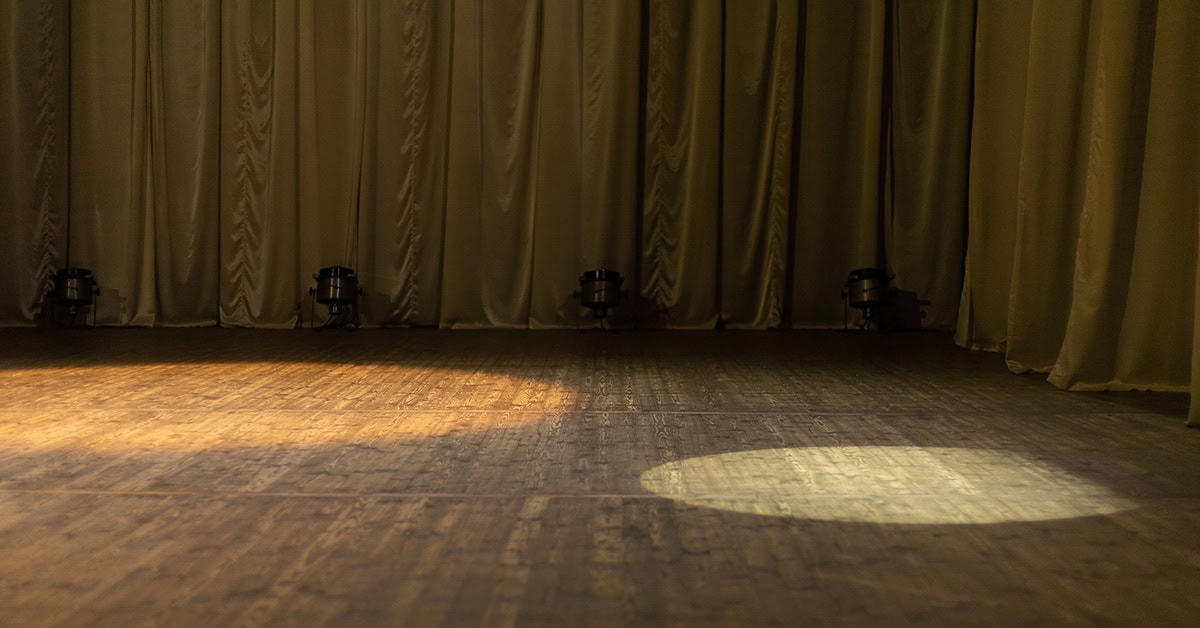
Recommended Shows for Drama Festivals
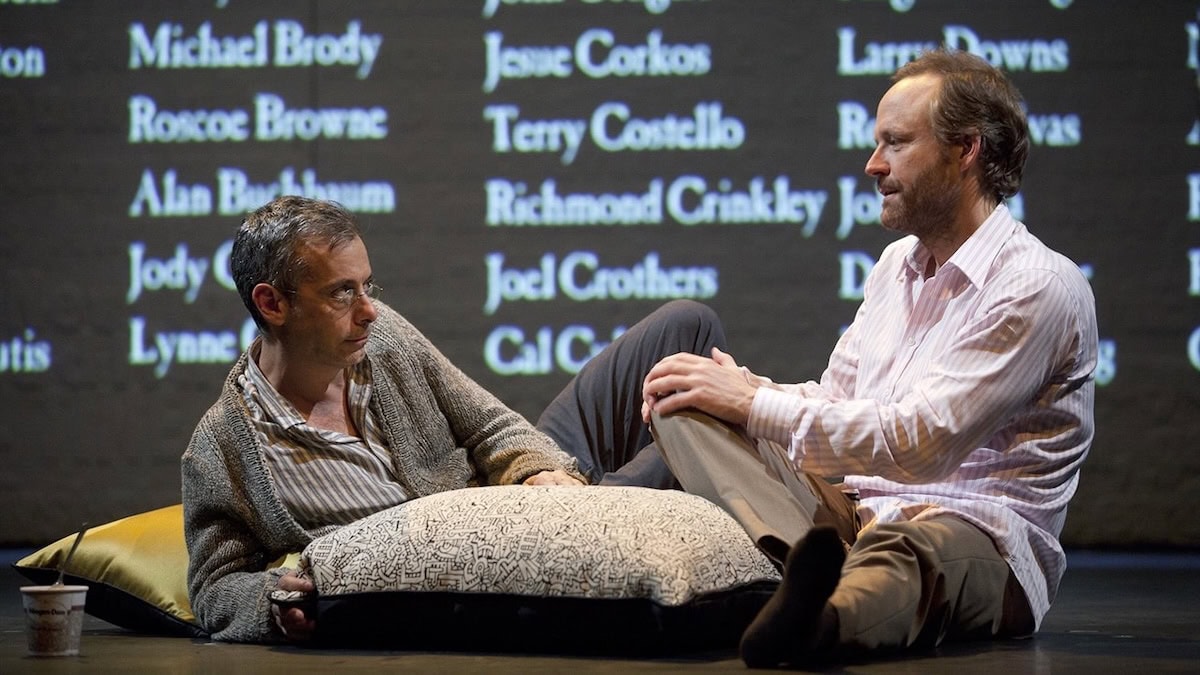
The Truth Behind… The Normal Heart
